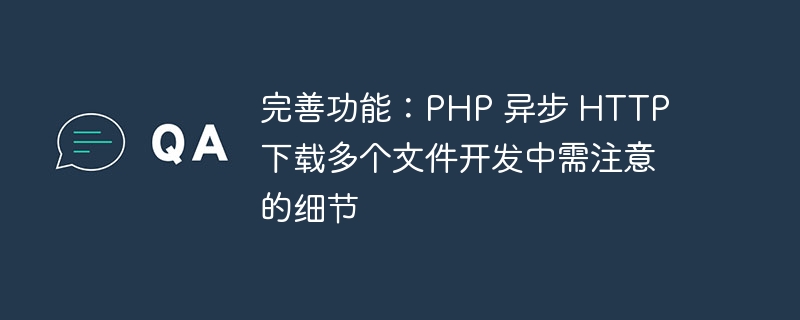Home >Backend Development >PHP Tutorial >Improved functions: Details that need to be paid attention to in the development of PHP asynchronous HTTP downloading of multiple files
Improved functions: Details that need to be paid attention to in the development of PHP asynchronous HTTP downloading of multiple files
- 王林Original
- 2023-09-12 13:22:41903browse

Perfect functions: PHP asynchronous HTTP downloads details that need to be paid attention to in the development of multiple files
Introduction:
In modern network applications, file downloading is a basic functions. For PHP developers, implementing asynchronous HTTP download of multiple files is a challenging task. This article will discuss the details that need to be paid attention to during the development process to help developers successfully complete the improvement of this function.
1. Understand the concept of asynchronous HTTP download
Asynchronous HTTP download refers to downloading multiple files at the same time within a request cycle without blocking the progress of other tasks. This technology can improve the efficiency of file downloading, especially when multiple large files need to be downloaded.
2. Choose the appropriate HTTP client library
When performing asynchronous HTTP download, it is crucial to choose the appropriate HTTP client library. There are many libraries to choose from in PHP such as cURL, Guzzle, etc. Developers need to choose the right library for their project based on their needs and other factors.
3. Set a reasonable number of concurrent requests
When asynchronously downloading a large number of files, it is important to set a reasonable number of concurrent requests. If the number of concurrencies is too large, it may cause server overload or network congestion. On the contrary, if the number of concurrent connections is too small, the download speed will be limited. Developers need to make adjustments based on actual conditions to achieve the best download efficiency.
4. Use appropriate thread or process management mechanism
In order to achieve asynchronous downloading, developers can use thread or process management mechanism. These mechanisms can help developers handle multiple download tasks at the same time and improve download efficiency. However, it should be noted that threads and processes need to be managed carefully to avoid resource competition and concurrency conflicts.
5. Handling errors and exceptions during downloading
During the asynchronous download process, various errors and exceptions may occur. For example, the network connection is interrupted, the file does not exist, etc. Developers need to consider these situations in advance and write corresponding error handling and exception handling mechanisms to ensure the stability and reliability of downloads.
6. Reasonable file saving and naming strategies
When downloading multiple files, reasonable file saving and naming strategies can make file management easier. Developers can design the file's saving path and naming rules based on the file's source, type, size and other information to improve the readability and organization of the file.
7. Optimize download performance
In order to improve download performance, developers can take some optimization measures. For example, use a caching mechanism to reduce repeated downloads, use breakpoint resumption to reduce bandwidth usage, and so on. These technologies can greatly improve download efficiency and provide users with a better download experience.
Conclusion:
Asynchronous HTTP downloading of multiple files is a challenging task, but by understanding the concepts, choosing the appropriate library, setting a reasonable number of concurrent requests, and using appropriate thread or process management Mechanism, handling errors and exceptions, designing reasonable file saving and naming strategies, and optimizing download performance, we can successfully complete the development of this feature. I hope that the attention to detail provided in this article can help PHP developers achieve better results during the development process.
The above is the detailed content of Improved functions: Details that need to be paid attention to in the development of PHP asynchronous HTTP downloading of multiple files. For more information, please follow other related articles on the PHP Chinese website!
Related articles
See more- Several common ways of asynchronous execution in PHP
- The front-end uses formdata to asynchronously upload the form form, and the detailed tutorial obtained from the backend (php) is available for personal testing. (Source code attached)
- Where to download ps
- What does http represent in the URL entered in the IE address bar?

